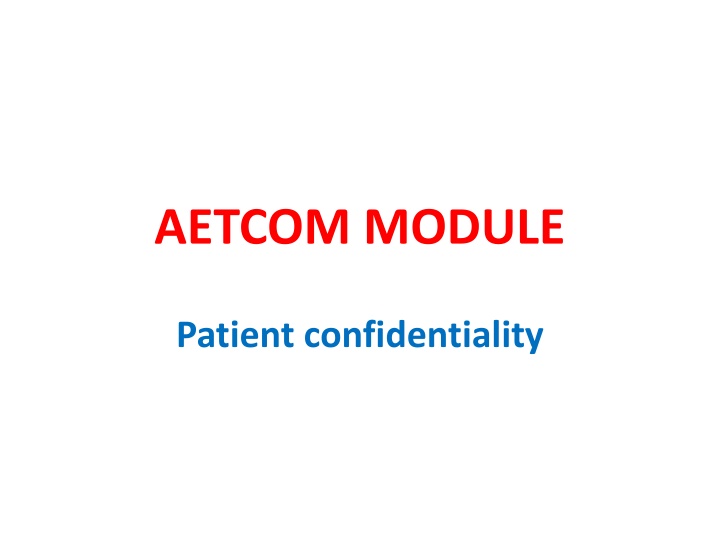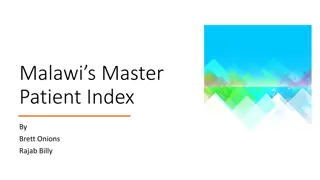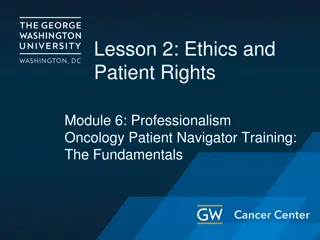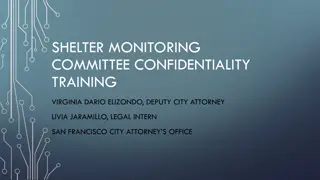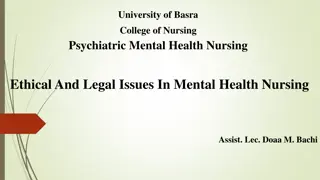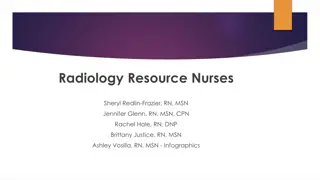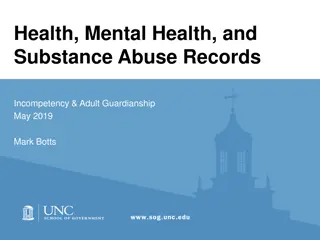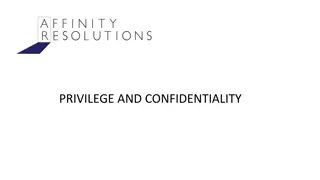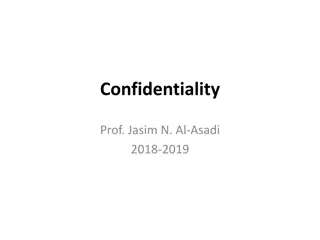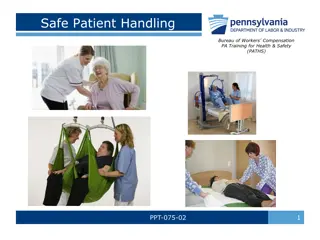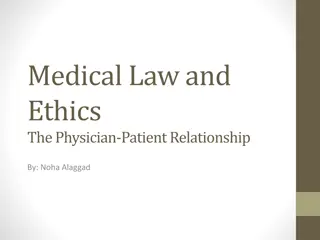Patient Confidentiality and Rights in Healthcare
This content discusses the importance of patient confidentiality, ethical considerations, and the rights and responsibilities of patients in healthcare settings. It explores a case involving HIV testing and the delicate balance between patient privacy and public health concerns. Additionally, it highlights the Ministry of Health and Family Welfare's Charter of Patients Rights in India.
Download Presentation

Please find below an Image/Link to download the presentation.
The content on the website is provided AS IS for your information and personal use only. It may not be sold, licensed, or shared on other websites without obtaining consent from the author.If you encounter any issues during the download, it is possible that the publisher has removed the file from their server.
You are allowed to download the files provided on this website for personal or commercial use, subject to the condition that they are used lawfully. All files are the property of their respective owners.
The content on the website is provided AS IS for your information and personal use only. It may not be sold, licensed, or shared on other websites without obtaining consent from the author.
E N D
Presentation Transcript
AETCOM MODULE Patient confidentiality
Learning objectives At the end of the session, Phase II MBBS students must be able to: Discuss the rights and responsibilities of patients Discuss the rights and responsibilities of the laboratory with respect to confidentiality of lab results Understand the ethical issues involved in confidentiality pertaining to patient identity Demonstrate empathy, counselling and maintenance of confidentiality in doctor- patient relationship
Case: Do not tell my wife Ramratan was in tears. How is it possible doctor? We are expecting our son soon. He will not have a father . Ramratan had seen you with vague aches, fever, weight loss and cough with expectoration not responsive to antibiotics for the past three months. He had a right mid zone lung shadow on X-ray and the sputum was positive for AFB. On being questioned, he had revealed that he had unprotected sexual intercourse with multiple partners 3 years ago. But I stopped after I married Danno, doctor - I am faithful to her . An informed consent was obtained and HIV screening test was ordered and it was positive. A confirmatory test was subsequently obtained and it was also positive. The CDC count was < 100. Ramratan had come to discuss the results of his HIV test.
After consoling him and writing out prescriptions for TB and HIV, you mention to him that he must bring his wife for testing. This is important, Ramratan , you add - especially since she is pregnant. Absolutely not, sir! he explosively retorts. That is not possible. I will be humiliated. Danno will leave me and go. I will never be able to see my son. I will become an outcast in our community. I can t live without my wife, doctor. I urge you, doctor- don't do this. I forbid you
Rights and responsibilities of patients Ministry of Health and Family Welfare (MoHFW) has recently released a Charter of Patients Rights that compiles the lawful rights as stated in the Constitution of India 1. Right to Information- Physicians or their qualified assistants are required to provide adequate information about patient illness, its diagnosis (provisional/ confirmed), proposed investigation, possible complications to the patient. If the patient is not in a state to understand this, the physician or their assistant is required to provide the information to the caretaker. This has to be done in a simple language that the patient or caretaker will understand.
2. Right to records and reports- Patients/ their caretakers have the right to access the originals or copies of case papers, indoor patient records and investigation reports. Investigation reports have to be made available to them within 24 hours of admission or 72 hours of discharge. 3. Right to emergency medical care 4. Right to informed consent
5. Right to confidentiality, human dignity and privacy- The code of ethics dictates doctors to hold information about the illness & treatment plan for the patient in strict confidentiality from everyone except the patient and their caretakers. Unless it is an exceptional case where sharing this information is in the interest of protecting other or due to public health considerations. In the case of a female patient, she has the right to demand the presence of another woman if the medical practitioner checking or treating her is male.
6. Right to non-discrimination 7. Right to safety and quality care according to standards 8. Right to choose alternative treatment options if available 9. Right to a second opinion 10. Right to transparency in rates, and care according to prescribed rates wherever relevant 11. Right to choose the source for obtaining medicines or tests 12. Right to proper referral and transfer, which is free from perverse commercial influences
13. Right to protection for patients involved in clinical trials 14. Right to protection of participants involved in biomedical and health research 15. Right to be discharged, Right to receive the body of a deceased person from the hospital 16. Right to Patient Education 17. Right to be heard and seek redressal
Patients responsibilities 1. Complete information: To Provide complete information about his/her health, including past condition, past illness, hospitalization, medications or any other matter pertaining to his health etc. 2. Complete demographic details: To provide complete and accurate information regarding his identity, address, insurance cover or any other information. 3. Abide by hospital rules: To abide by hospital rules & responsibilities- no smoking policy, visitor policy, not to bring outside food, flowers, arms/weapons to the hospital
4. Minimum luggage/ follow infection control: To keep minimum luggage in the ward for infection prevention and also abide by infection control norms as educated by treating team. 5. Respect & courtesy for others: To treat other patients, attendants, visitors and hospital staff with courtesy. 6. Inform treating team: Not to take any medication/alternative therapy without the knowledge of treating team. 7. Pay fee: To pay for the services availed as per hospital rules and regulations. 8. Accept measures for privacy & confidentiality of records: To accept measure taken by the hospital to ensure privacy and confidentiality of medical records
Laboratory responsibility towards patient confidentiality All employees in laboratory are bound by legal duty of confidence to protect personal/ sensitive information they may come into contact with during the course of their work. All staff is trained to ensure how information is used, to keep information up to date, adhere to retention and disposal of records procedures, report any breaches in line with lab reporting policy. Staff should not - share more information than is absolutely necessary - use patient identifiable information is the purpose can be satisfied by using anynymous information
- access records of friends, relatives, neighbours, colleagues unless they have a legitimate professional relationship - share information externally without referring to quality management system ethics policy. - ignore breaches of this policy Paper records are sited in secure areas with appropriate entry control under lock and key in cabinet. Under no circumstances, the test results are made known to any third party without the written consent of the patient or users. Test results are transmitted electronically with only to medical practitioners from patient/user. Verbal request is confirmed by laboratory by making phone call.
Disclosures The Medical Council of India s Code of Ethics Regulations protects patient confidentiality by stating that the physician shall not disclose the secrets of a patient that have been learnt in the exercise of his/her profession except in a court of law under orders of the Presiding Judge; in circumstances where there is a serious and identified risk to a specific person and/or community; [or in case of] notifiable diseases. On police request, court order, when patient life may be in danger or when patient is not capable of making appropriate decision, when there is danger to other people/health care professional/ community.
PROFESSIONAL SECRECY (confidentiality) It is an implied term of contract between the doctor and his patient. The relationship of doctor and patient requires utmost trust, confidence, fidelity and honesty. The doctor is obliged to keep secret, all that he comes to know concerning the patient in the course of his professional work.
Examples (1) A doctor should not discuss the illness of his patient with others without the consent of the patient. (2) If the patient is major, the doctor should not disclose any facts about the illness without his consent to parents or relatives even though they may be paying the doctor's fees. In the case of a minor or an insane person, guardians or parents should be informed of the nature of the illness (3) A doctor should not disclose any information about the illness of his patient without the consent of the patient even when requested by a public or statutory body, except in case of notifiable diseases (4) Even in the case of husband and wife, the facts relating to the nature of illness of the one, must not be disclosed to the other, without the consent of the concerned person.
Privileged communication It is a statement made bonafide upon any subject matter by a doctor to the concerned authority, due to his duty to protect the interests of the community or of the State.
Examples of privileged communication (1) Infectious Diseases: If a patient suffering from an infectious disease is employed as cook or waiter in a hotel, or a food- handler with an enteric infection, or a teacher with tuberculosis or other infective disease, or as children's nurse, etc., he should be persuaded to leave the job until he becomes noninfectious. If the patient refuses to accept this advice, the doctor can inform the employer about the illness of his patient.
(2) Venereal Diseases: a. If a person is suffering from syphilis and is about to marry, it is the duty of the doctor to advice the patient not to marry till he is cured; if the person refuses, the doctor can disclose the syphilitic condition of the patient to the woman concerned or to her parents. b. Swimming pools should be prohibited to those having syphilis or gonorrhoea, but if the person refuses, the authorities can be informed. c. The doctor can inform the warden of a hostel, if any boarder is suffering from venereal disease.
(3) Servants and Employees: An engine driver or a bus driver or a ship's officer may be suffering from epilepsy, high blood pressure, alcoholism, drug addiction, or colour blindness. The doctor should persuade the patient to change his employment, because of the dangers of his present occupation, both to himself and to the public. If this fails, the doctor should inform the employer, that the patient is unfit for that kind of employment. (4) Notifiable Diseases: A medical practitioner has a statutory duty to notify births, deaths, infectious diseases, etc., to the Public Health authorities.
(4) Suspected Crime: Every person, aware of the commission of, or of the intention of any other person to commit any offence shall immediately give information to the nearest Magistrate or police officer of such commission or intention. If the doctor learns of a serious crime, such as murder, assault, rape, etc. by treating the victim or assailant, he is bound to give information to the police. Thus, if a doctor treats a person suffering from gunshot or stab wounds due to criminal assault, he must inform the police.
(6) Patient's own Interest: The doctor may disclose the patient's condition to some other person, so that he may be properly treated, e.g., to warn the parents or guardians of signs in the patient of melancholia, suicidal tendencies, etc. (7) Self-interest: Both in civil and criminal suits by the patient against the doctor, evidence about the patient's condition may be given. (9) Courts of Law: In a Court of law, a doctor cannot claim privilege concerning the facts about the illness of his patient, if it is relevant to the inquiry before the Court.
PURPOSE IS INTEGRATION TESTING AFTER WRITTEN CONSENT COUNSELLING CONFIDENTIALITY MAINTAINED
Informed consent Informed consent written written Taken by the counsellor appointed at the ICTC before doing test
Who can give the consent? Person/client himself Minor- parents/ guardian Physical or mental incapacity: parents or relatives Unconscious person without any body accompanying - by two doctors
Counselling Confidential communication limited to patient and counselor with purpose of understanding risk of HIV infection, to help cope with stress and to make personal decisions related to HIV/AIDS. Pre- and post-test counselling In Pre- test counselling : Assessment of risk behaviour Signing the informed consent form
Confidentiality & Disclosure Confidentiality has to be kept between a counsellor and a client or between a treating doctor & a patient Report should be handed over to the client/patient by the counsellor himself in ICTC in a sealed envelope, which has only PID Number written on it.
Post- test Counselling In Post- test Counselling: People who are found HIV NEGATIVE: are encouraged & boosted to maintain the status People who are found HIV POSITIVE are provided life saving care, treatment & support
For the protection of another person (spouse)-- Counsel and encourage patient to inform partner (self-disclosure). Marriages Law demands
GATHER Approach G = Greet the client A = Ask about the problem Active listener Assess degree of risk behavior Show respect and tolerance Enable patient or client to express freely Determine access to support and help in family and community T = Tell the client about specific information that he or she desires H = Help them to make decisions E = Explain any myths or misconceptions(also known as INFORMED DECISION MAKING) R = Return for follow up or Referral
Case discussion In given situation/case scenario, identify the events that show disrespect / breach in confidentiality to the clinical sample/ data and suggest ways to rectify them
1) A literate HIV patient who is admitted in your hospital gets embarrassed when he finds the test result mentioned on his case file. When his relatives come to visit, they find out about the result, shout at him and never visit again.
2) A patient, Mira goes to a psychiatrist for consultation and signs on the reception appointment register. Coincidentally, her co- worker comes in for her appointment and sees Mira s name on appointment register and reveals to all colleagues at work that Mira is seeking help from a psychiatrist.
3) You are treating a Covid-19 positive patient and he does not want you to reveal his diagnosis to others. You discuss with your colleague about the case while in the elevator.
4) A nurse has a needle stick injury while performing phlebotomy. The patient s HIV and HBV status is unknown. The patient is refusing to get tested for HIV. The nurse decides to use the patient blood sample collected for some other test for testing for HIV.
5) A 36 year old airline pilot is seeking treatment from his local medical practitioner for new onset epilepsy. The doctor reports the condition to the airline company. The pilot threatens the doctor to sue him for disclosing his clinical condition.
6) A RTA patient scheduled for emergency surgery is being shifted to OT but his HIV test report has not come back. His relatives call the lab and demand to get the report.
